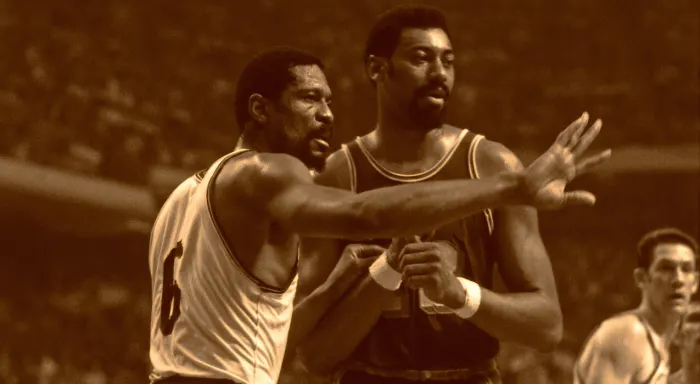
The 1961-62 NBA season is one of the most remarkable in basketball history. Wilt Chamberlain’s dominant performances, including his legendary 100-point game, seemed to make him the logical choice for the MVP. After all, Wilt averaged an unfathomable 50.4 points per game and 25.7 rebounds per game, putting up numbers that no one had ever seen before and that have yet to be matched. Yet, despite this dominance, it was Bill Russell who won the 1962 MVP award. The question many still ask is: How could someone with numbers like Wilt’s not win the MVP, and how did Bill Russell – who had significantly lower statistics – manage to secure the honor?
Wilt’s Statistical Supremacy vs. Russell’s Impact
Wilt Chamberlain’s 1961-62 season is considered one of the most individualistically dominant campaigns in the history of the NBA. His ability to score at will and control the boards was nothing short of spectacular. Not only did he average 50.4 points per game, but he also grabbed 25.7 rebounds per game, essentially setting the standard for statistical greatness. His 100-point game against the New York Knicks remains an iconic moment in basketball history, and his impact on the floor was undeniable. Many expected his performance to translate into an MVP win, but the award ultimately went to Bill Russell, whose numbers were far less eye-popping – about 19.6 points per game and 24.7 rebounds per game. So, why did Russell win?
Team Success and the Celtics’ Record
One key factor in the MVP decision was team success. While Wilt Chamberlain was clearly an individual force for the Philadelphia Warriors, his team finished with a 49-31 record, good for third in the league. In contrast, Russell’s Boston Celtics finished with the 
While individual statistics are certainly important, the MVP voters of that era – who were fellow players – often placed significant emphasis on how a player’s efforts translated to wins. This is where Russell’s value truly shone. Despite not putting up the same mind-boggling numbers as Wilt, Russell’s leadership and contributions to the Celtics’ system were invaluable. He was regarded as the emotional and defensive leader of one of the greatest basketball teams ever assembled. His ability to anchor the Celtics’ defense and influence the game beyond scoring helped elevate his team to the best record in the league.
The Role of Team Play and Leadership
As the centerpiece of the Celtics’ success, Russell was more than just a stat sheet stuffer. He was the heart of a team-oriented system that won championships through collective play, not individual brilliance. While Chamberlain dominated in individual matchups, Russell’s ability to affect the game without necessarily relying on his scoring was the defining characteristic that made him the Celtics’ engine. Russell was known for his remarkable shot-blocking, rebounding, and defensive presence, which were crucial to Boston’s success.
Bill Simmons, in his book *The Book of Basketball*, delves deeper into the reasoning behind Russell’s MVP win, arguing that the voting reflected a deeper perception of the game. Chamberlain was seen by some of his peers as somewhat selfish and more concerned with personal achievements than team success. His obsession with accumulating statistics often overshadowed his team’s ability to win consistently. In contrast, Russell was the epitome of a team player, always willing to do what it took to win – whether that meant scoring less or deferring to teammates. Russell’s leadership and selflessness resonated with his fellow players, who voted him MVP despite Wilt’s statistical dominance.
Oscar Robertson’s Case
Another intriguing aspect of the 1961-62 MVP voting was the performance of Oscar Robertson, who averaged a triple-double for the season – 30.8 points, 12.5 rebounds, and 11.4 assists. Robertson’s all-around brilliance arguably should have placed him higher than third in MVP voting, yet he finished in a distant third with 135 points. It was a strange scenario where the first-ever triple-double season in NBA history seemed to be overshadowed by Russell’s impact on the Celtics’ team success and Wilt’s individual stats.
The MVP Voting Process and the Player’s Perspective
It’s important to note that the MVP voting in 1962 was determined by the players themselves. This gives additional context to the outcome, as players tend to value intangibles such as leadership, defense, and the ability to elevate a team’s play. While Wilt’s individual feats were stunning, Russell’s dedication to team basketball and his championship success made him the more “valuable” player in the eyes of his peers.
Conclusion: More Than Just Stats
In the end, Bill Russell’s MVP win over Wilt Chamberlain in the 1961-62 season can be attributed to a combination of factors. Wilt’s mind-boggling individual stats, while impressive, did not result in a comparable team success. Russell’s Celtics not only had the best record in the league, but he was also the leader of a system that prioritized defense, teamwork, and winning. Russell’s value was not in his scoring or statistics alone, but in his ability to elevate the Celtics to the highest level of competition.
Ultimately, the MVP was a reflection of the broader value of winning, leadership, and team play, all of which Russell embodied. Wilt’s season remains one of the most dominant individual performances in NBA history, but Russell’s influence on the Celtics’ success made him the most “valuable” player in the eyes of his peers.
Leave a Reply